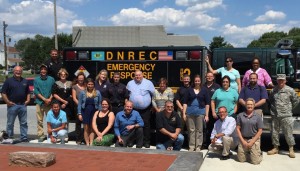First Responders Preparing for Intentional and Natural Disasters
Chris Brunner, October 5, 2015

AWR course instructor, Tracey Stevens, front left, joins New Jersey Department of Agriculture public health directors and state veterinarian in Lawrenceville.
First responders in a New Jersey workshop learned how an “all hazards” approach aids in preparing for disasters that can affect the agricultural industry. Having a response action plan in which all community members and organizations have a coordinated disaster response strategy creates an effective community response for an incident of intentional contamination, or from a natural disaster.
Mercer County Division of Public Health partnered with the Rural Domestic Preparedness Consortium, to offer course AWR 151: Understanding the Dangers of Agroterrorism, in Lawrenceville, NJ, on September 29.
Lawrenceville, a community in Lawrence Township, located between two historically prominent neighbors, Princeton and Trenton, was the scene of the workshop attended by 52 participants representing people from state government, fire, law enforcement, emergency management, and other first responder agencies.
AWR 151 is one of many courses offered by the RDPC, a partner of the National Domestic Preparedness Consortium, which is a DHS/FEMA training partner under DHS/FEMA’s Homeland Security National Training Program Cooperative Agreement. The collection of universities and non-profits offer training on diverse subjects effecting rural communities such as rail car derailments, pipeline explosions, and mass fatalities planning and response for rural communities. The Western Institute for Food Safety and Security, (WIFSS), with the University of California Davis’s School of Veterinary Medicine, is one of RCPC’s partners, working primarily on food and agricultural issues.
Tracey Stevens, deputy director, Animals in Disasters, WIFSS, was the instructor for the AWR 151 class designed to increase awareness about the potential targets and impacts of food safety emergencies. Participants learned the importance of using an all hazards approach to identify and defend against pathogens, chemical and biological contaminants, and other hazards that affect the safety of the foods we eat, whether from an incident of intentional contamination, or from a natural disaster.
Stevens also taught AWR 151 in Louisville, KY, in September, and both the AWR 151 and 152 classes in Dover, DE, in early August. AWR 152, Principles of Preparedness for Agroterrorism and Food System Disasters, is designed to prepare members of emergency response teams to evaluate the overall risk of an intentional attack on a segment of agriculture or a segment of the food system and to provide information about methods to limit vulnerabilities in identified targets.
Training in Delaware was hosted by DEMA Delaware Emergency Management Agency where more than 30 participants identified potential targets and conducted threat assessments via table top exercises and case studies.
New Jersey Department of Agriculture, Legislative Liaison, Robert Vivian, Jr., wished Stevens could stay longer in New Jersey to do a series of these courses throughout the state. Vivian will have the chance to take another class when Stevens returns to Lawrenceville in November to teach the AWR 152 class.

